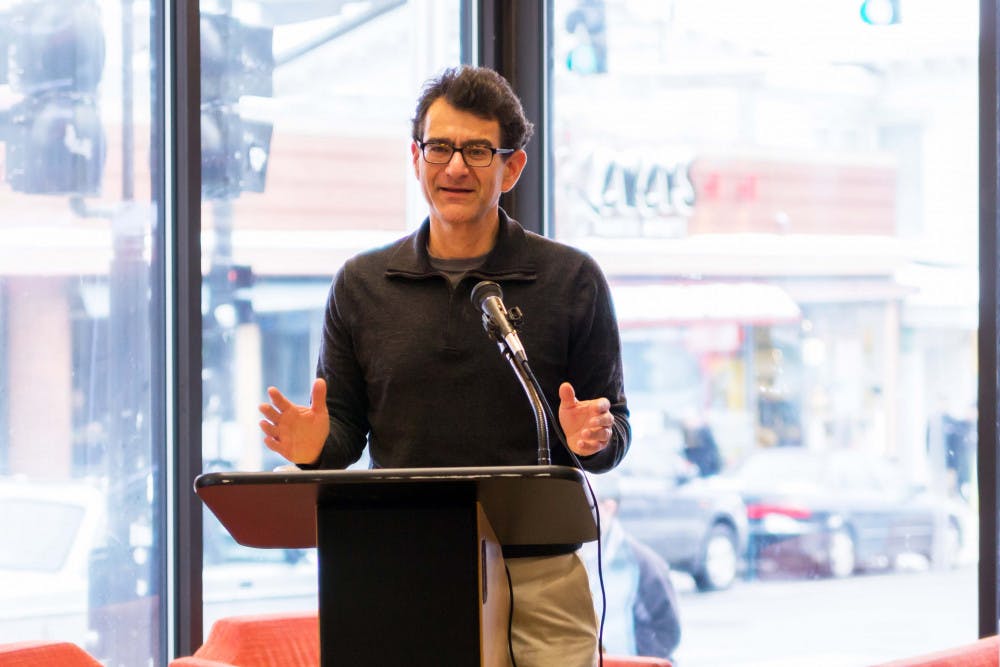Jon Birger ’90 returned to campus Tuesday afternoon to discuss his newest book “Date-onomics: How Dating Became a Lopsided Numbers Game.”
Birger started the hour with a prepared talk, discussing why an abundance of college-educated heterosexual women have been unsuccessful in their hunt for Mr. Right.
After leaving College Hill, Birger found it “perplexing” that his male friends were marrying earlier and more easily, while his female friends who had “absolutely everything going for them dating-wise” were stuck in the dating market as unhappy singles.
“A lot of the guys … are dorks like me, and we were all married, and I couldn’t figure out why it was so much easier for us,” he said.
Living in New York, Birger originally credited men’s greater success in the dating world to a “Sex and the City”-type effect, in which cosmopolitan cities, in their seemingly glamorous nature, drew more women than men.
But further research showed him that this lopsided dating market wasn’t just a big-city phenomenon, but a national one.
Birger found that thanks to the growing number of women attending college, the United States is experiencing a growing divide between the number of college-educated men and women. While same-sex marriages are not affected, the gender ratio leaves college-educated women seeking a husband with limited options. Men, on the other hand, are spoiled with options and reluctant to settle down — hence why Birger originally wanted to title his book “It’s Not You, It’s the Ratio.”
In addition to forcing college-educated heterosexual women to wait around for their Prince Charmings, Birger says the sex ratio may also be driving a wilder college experience.
Throughout his talk, Birger consistently rejected the idea that technology, such as the dating app Tinder, is at fault for a more sexualized society. There is, as he put it, “a long, ridiculous history of people blaming the latest technology for people having more sex.” For instance, in the 1920s, society pointed the finger at the automobile, calling it “a house of prostitution on wheels,” he said.
Birger, on the other hand, attributes the rise of hookup culture to the lopsided sex ratio at colleges across the country. His findings show that campuses with a higher proportion of females tend to facilitate casual relationships, as men find themselves spoiled by choice and insist on playing the field rather than settling down for a few months of monogamy.
But at places like the California Institute of Technology, where the gender ratio is highly male, Birger discovered more men inclined to make romantic gestures. Many boyfriends reported their Valentine’s Days were spent making hand-crafted valentine cards and homemade pancakes — not the play-the-field type.
“So if you’re not having good luck dating here, move?” one man in the audience asked.
Yes, Birger responded. In an idealistic world, you may want to hit up Caltech, Silicon Valley or Aspen, where due to the techie- and ski-dominated industries, heterosexual women may have more luck with the ratio. But for those grounded with jobs, kids and responsibilities, it may be more reasonable to look for love at a different education level: after all, a shortage of men in the college-educated dating pool means an oversupply of men in the non-college-educated field.
“Hearing something like this, it’s like a lightning bolt that explains so much,” said Aaron Mayer ’18.5, who was drawn to the event thanks to his experience at the Hack@Brown, where he worked on an app that will hopefully make dating at Brown easier. “You think, ‘Wow, this is really a phenomenon.’”
Birger’s talk may have given some reason to leave the talk feeling optimistic, encouraged by his assurance that failed relationships are not based on trivial matters like “answering his text 10 minutes too early or 10 minutes too late.” According to Birger’s logic, in many cases, unsuccessful romantic pursuits are not anyone’s fault, but consequences of the ratio.





